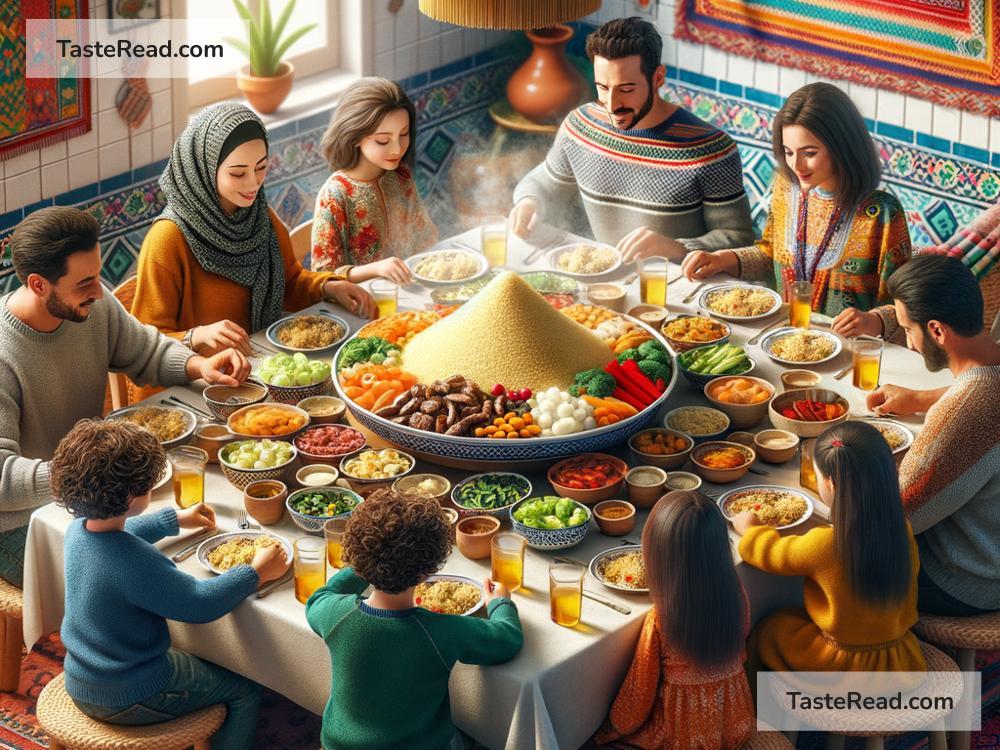The Significance of Couscous in Algerian Family Gatherings
Couscous is more than just food in Algeria; it’s a symbol of family, tradition, and togetherness. For centuries, this beloved dish has been a cornerstone of Algerian culture, bringing people closer during celebrations, religious events, and weekly meals. Its cultural importance goes far beyond its taste or preparation—couscous represents unity, love, and the rich heritage of the Algerian people.
What is Couscous?
Couscous is a staple food in many North African countries, including Algeria. It’s made from tiny granules of semolina wheat, which are steamed several times to achieve a fluffy texture. It’s a versatile dish that can be served with vegetables, meat, fish, or even sweet ingredients, like raisins and almonds, depending on the occasion.
The process of making couscous is as much an art as it is a meal. In traditional Algerian homes, women often gather in the kitchen to prepare couscous by hand. They roll the semolina granules and ensure the dish is perfected with love and care. This makes the experience not just about cooking, but also about bonding and preserving traditions.
Couscous as a Symbol of Unity
In Algeria, couscous is not just a dish—it’s a social event. It often takes center stage at family gatherings, where it is shared among relatives, friends, and neighbors. Sitting together around a large plate of couscous is a ritual that fosters a sense of community and warmth. Every spoonful is a reminder of the generosity and hospitality that Algerians value deeply.
At these gatherings, couscous is served in a communal bowl, and everyone eats from the same plate. This tradition reflects the importance of sharing and equality. Whether you’re young or old, family or guest, eating couscous together symbolizes that everyone is part of the same circle.
The Role of Couscous in Celebrations
Couscous plays a special role in Algerian celebrations. During weddings, Eid holidays, births, and other major life events, couscous is often the centerpiece of the feast. For weddings, it may be prepared with lamb, chicken, and a variety of rich spices to mark the joyous occasion.
On Fridays, the holy day in Islam, couscous is traditionally served for lunch after prayers at the mosque. For many families, Friday couscous is a weekly tradition that brings everyone together to pause from the busy week and reconnect. Parents, grandparents, and children gather around to share a meal while discussing life, laughter, and stories.
Couscous is also prepared during somber occasions, such as funerals, to offer comfort and show solidarity. Offering couscous to loved ones during difficult times is a way of expressing care and support.
How Couscous Reflects Algerian Traditions
Couscous is deeply connected to Algeria’s agricultural roots. The dish showcases local produce, such as fresh vegetables (like carrots, zucchini, and turnips) and meats like lamb or chicken. These ingredients reflect Algeria’s connection to the land and its traditional way of life.
The spices used in couscous also capture the flavors of Algerian cuisine. Cumin, paprika, cinnamon, and turmeric bring warmth and depth to the dish. Each family has its unique recipe, handed down through generations, making every plate of couscous a reflection of their personal history.
Moreover, the preparation of couscous emphasizes patience and teamwork. It’s not a quick meal—it requires time, skill, and attention. This mirrors the values of Algerian culture: taking the time to do things properly and embracing the rewards of hard work.
Couscous: A Bridge Between Generations
For Algerians, couscous is more than food—it’s a way of keeping traditions alive. When elders teach younger generations how to prepare couscous, they aren’t just passing on cooking techniques; they’re passing on stories, values, and identity. These lessons take place in warm kitchens, where laughter fills the air and knowledge is shared over kneading and steaming.
It’s also a way for Algerian families to maintain their connection to history. Couscous has been a part of North African cuisine for thousands of years, and continuing the tradition ensures that this cultural heritage stays strong.
Couscous Around the World
While couscous is a central part of Algerian culture, it has also gained popularity around the world. People from different countries enjoy its flavors and simplicity. This global recognition reflects the universal appeal of Algerian cuisine and culture. Still, for Algerians, couscous remains closest to the heart—a dish that carries memories, love, and meaning.
Conclusion
Couscous is much more than a meal in Algeria. It’s a powerful symbol of unity, tradition, and identity. From joyous celebrations to weekly gatherings, it has a way of bringing people together and fostering connections. Its preparation, taste, and communal nature embody the warm, generous spirit of Algerian families.
Through couscous, Algerians celebrate their heritage, pass down their culture, and create lasting memories. So, the next time you sit down to enjoy a plate of couscous, remember its significance—it’s a dish full of love, history, and the power to bring people closer.


